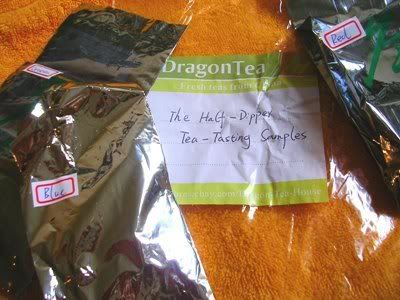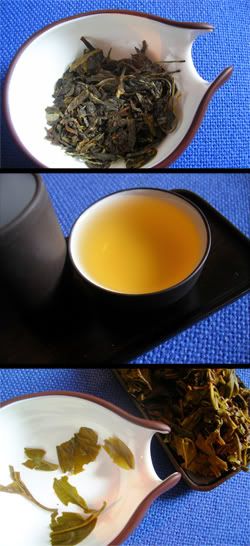You may have noticed rogue posts appearing and disappearing on the Half-Dipper lately - these are the results of my trying to get the publish-via-email mechanism working. So far, I think I've managed to include small images into textual descriptions, and so it may be possible that I'll be able to contribute to the Half-Dipper from afar. Again, any tips from our roving Blogspot correspondents would be a treat!
The trip should be from 7 - 25 September, nominally containing a two-week engineering event in one of the universities. Hopefully, it will allow some time in the schedule for some jaunts along Maliandao. If I've got your address, stay tuned for interesting goodies, provided that I can successfully navigate the Chinese Post Office...

I understand that samples for the Tasting Event are beginning to arrive at their destinations! This is good news. Mine have recently arrived - thanks, Gordon.
The first tea ("blue") is one that I've been meaning to try for quite some time. Do please bear with me, as I know I rather unfairly have the advantage in being aware of the actual teas - I'm looking forward to reading some more opinions, and in some further discussion once all the notes are in, at which point we can discuss the actual factories and cakes by their true name.
"Scottish Mountain" @ 100C in 10cl shengpu pot; ~8-9g leaf; 1 rinse
 Dry leaf:
Dry leaf:Pretty leaves, with some tips, which have experienced good handling as evinced by their surface condition. The aroma is particularly sweet.
3s, 3s, 5s, 7s, 10s:
The soup is slightly orange, which actually starts yellow. From the sugary-sweet aroma in the wenxiangbei, I anticipate a similarly sweet flavour. This turns out to be the case: the flavour is instantly fruity, with a citrus backing, a robust sweetness running throughout.
The texture of the soup is smooth, perhaps influenced by the tips and general good leaf condition. There is a pleasant acidity woven into the citrus fruits that promotes a gentle huigan.
Later infusions continue to become sweeter, and sweeter, and yet sweeter! It is pleasantly tart, if perhaps uninspiring in its total range of flavours: it soldiers on, delivering the citrus fruits well enough, though.
Wet leaf:
Baby spring leaves, about 2cm in length, are seen to be fairly fragmented - there aren't very many whole leaves in here, as pretty as the dry leaves looked.
Overall:
The sweet, gentle nature of this tea is explained by the tiny little leaves. It delivers quite a caffeine punch, being fairly energetic, but the flavours are restricted to the upper half of the spectrum: sweet, fruity, tart.
The overall result is pleasant, if not inspiring, and (given that I know the actual price, forgive me here) it seems like decent value - which was my initial suspicion. It's good to have tried this cake, having long been on my radar, and it'll be interesting to see what other opinions are out there.

10 comments:
All of Aug and so far, blogspot.com is not blocked .. but xanga.com and wikipedia.org are blocked.
http://proxy.pign.net/unblock-bebo
is a good by-pass site. Talk with your Chinese colleagues about Skype .. be interested in their comments .. Also I just sent review of RGB samples ... john
my notes on "blue," forwarded to hobbes yesterday:
125 ml gaiwan, full boil water. First infusion, sweetness emerging immediately, not much bitterness, no smoke. Mild bitterness emerging in subsequent infusions—some aging potential, perhaps? Am surprised by the energy of this tea—fairly potent stuff. However, the flavors and aesthetics of it are those of a very ordinary young sheng. Not unpleasant, but not much to say about it, and I lost interest after 4-5 infusions.
a slightly different take on this tea than our esteemed host; i'll anxiously await the revelation of its identity.
mike
Dear John,
Great stuff - thanks; with your permission, I'll copy the notes into this thread.
Dear Mike,
Well... of all three cakes, I did expect this one to produce the most varied reaction. All shall be revealed. :)
Toodlepip,
Hobbes
John tried all three teas with some friends in a local teahouse - the pictures may be seen over at Chabei. John's accompanying tasting notes:
Compression appeared to be the densest of the 3. Colour is dull. A few stems/twigs in the mix along with a hair sample. (stuff happens) Leaf size is small with loose chop. No redeeming characteristics.
One infusion to clean .. 5 infusions .. 6th infusion close to exhausting the leaves
Soup colour; slightly less saturated than RED, but showing signs of life.
No distinguishing aroma(s) had to work to pull anything worthy of note.
Taste: smooth and even. too young to provide any meaningful indicators.
Wet Leaves: mixed bag, no distinguishing leaf type. Nice overall colour, with a few dark/brown in the mix.
My impression:
Sweet and simple with a mildly fruity aftertaste, the weak looking leaf conceals some relatively potent and linear feeling. Not thrilling, but enjoyable now (and perhaps only now). If I am allowed to guess at what it is I would say it is mostly from some "less desirable" area.
-vl.
impatient apricot. Im glad John mentioned seeing signs of life in the soup. I have not tried the green yet, but the red looked lifeless compared to this, which Starts with a cool pale yellow, and moving on to a light rusty orange at about the 4th or 5th. I would worry about it running out if given too much time to age, but would take the risk on a pair of binges if the price is modest.
-ian
100ml. gaiwan, 6.2g, 10s, 15s, 25s, 40s, 55s, 70s. Liquor was a typical young sheng color. Aroma had notes of wood, fruit, incense and smoke. Taste had notes of sweetness, fruit, and bitterness. Bitterness came on strong during 4th infusion, and the tea didn't interest me enough to keep going to see if it went away. Mouthfeel was a bit thin and watery. No qi noted. Not a very interesting tea, but not horrible.
First of all, thanks to Hobbes and Gordon for organizing the tasting. My samples arrived last week, and only now have I begun to try them.
Blue:
The dry leaf is young and mildly vegetal-smelling with a hay-like dryness to it. Large, flat, stemmy leaf, medium compression with a shard of bamboo-wrap cording mixed in. Mild smoke in the wengxiangbei, quickly dissapearing, leaving only a faint trace of grain-sweetness. Liquor is a pale yellow of decent clarity. Neutral mouthfeel leaving dryness on the tongue. Grain flavors; barley, popcorn. No ku to speak of. Flavors getting a little fruitier after 3rd infusion, towards apricot. Not getting the "citrus" theat hobbes mentioned at all. No huigan. Not impressed.
To venture a guess, by looking at DTH's current offereings, going on the look of the dry leaf and figuring this can't be one of the expensive ones due to its lack of qi, ku and huigan, I'll venture a guess: is this the 2006 Guo Zhi Yin Pu Shi Tribution 06-3 Cake? Second guess: 2007 Yun Zhi Beeng 0613 Cake.
Hello Everyone!
Sorry to be so late, but I just received the samples today. Back from work late, I have to go to bed in two hours at most. Yet I was really looking forward to tasting them. So even if it is a bit overkill to do that in a row, three gaiwans, three pitchers, and here we go!
***
I don't like the blue sample at all. I think there are many problems with this tea.
I understand why some liked the floral note, but the tea has some bad bitterness on the back of the tongue and some sourness on the top of the palate at the same time. A bit like if some passed oolong were mixed with some passed green tea.
After the third infusion, some sweetness appeared in the aftertaste, yet the tea was very thin, and definitely too green for my palate. I don't think it is good now, and I am quite sure it will worsens.
Dry Leaf:
This is the only sample to have survived in a (more or less) single chunk. Still not too hard to pry apart, though. The aroma is markedly different from the rest— it is very potent, full of fruity and floral fragrance, and has a bit of a twang (I don't typically use this word to describe aroma, but I lack a better way of describing it) to it.
Parameters:
8.0g leaf; 100mL gaiwan; filtered tap water (boiling); 8s rinse, 9s, 11s, 12s, 12s, 15s
Liquor:
This is definitely the sweetest-tasting sample of the three. I couldn't pick out much in the flavor, except a touch of tobacco. There was a lingering, sweet hui gan which was more intense than in the other two samples, and a consistently mild astringency. This tea also stimulated a good deal of salivation, which was pleasant.
I couldn't detect any cha qi in this sample. I didn't experience any of the sensations mentioned above. Also, while my jaw tightened up at the first signs of qi during the previous two tastings, (sort of like an early-warning device) nothing of the sort happened this time.
Last words:
I liked this tea, but not as much as the green sample I tasted first. I thought it was quite sweet and pleasant, but not all that stimulating or interesting.
Post a Comment